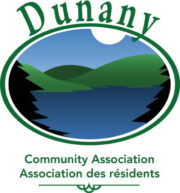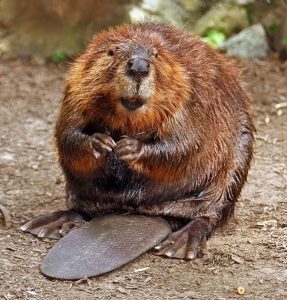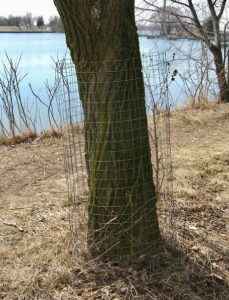Canadian beavers* are herbivores. Strict vegetarians!
The eat bark, leaves and plants.
They are active after dusk and stay away from humans. If you go swimming in the evening and get close to one it will flap its tail on the water to scare you away. That’s it.
You will usually find a beaver family on each of our lakes. They seldom do serious damage. If there are valuable trees on your shoreline, or close by, you should consider protecting them as shown on the left ide of this post.
DCA Policy.
Our policy at the DCA has not changed: we do not intervene unless the beavers are doing serious damage or threaten a property. Then, and only then will we ask a trapper to take them away. The trapping season begins in late October and any capture before that date must be justified. Removing a family of beavers from a lake is often futile as another will come to take its place sooner or later.
In 2019, at least one property on Black Lake suffered serious damage and beaver activity has been reported on both Black and Boyd.
If you observe suspicious activity like hut building, do not hesitate to call your lake sentinel.
Been here for 7.5 million years.
Since beavers have been on this planet for about 7.5 million of years, the shrubs they eat have developed defence mechanisms. For example, alder – their favourite food – will keep growing again even after having been cut by a beaver.
So, we will always have beavers. We could not eradicate them even if we wanted to. There are hundreds of millions of them in North America. Get rid of a family on a lake and next thing you know another has colonized it. That is why we talk about beaver management, beaver control.
The Argentinian Fiasco.
There we none in South America until Argentina decided to create a fur business in la Tierra del Fuego. In 1946 a military plane brought 10 pairs of beavers from Manitoba and let them loose in those islands at the extreme south of Argentina. There are now more than 100,000 of them in Argentina and Chili and they have created an ecological disaster: no predators, plants and trees with no defences. Now they are trying to eradicate them.They are finding that Canadian beavers are very resilient!
Stay away from Otters.
Finally, beavers should not be confused with otters of which we have a few in the Laurentian lakes. They are carnivores and been known to bite swimmers. If you spot one, stay away.
* There are also Eurasian beavers




All I know about giardia is what I learned from the public health web sites, especially from this page (in French) from l’Institut national de santé publique du Québec.
https://www.inspq.qc.ca/eau-potable/giardia-lamblia
I have learned that this parasite is quite common in freshwater and can be carried by domestic animals, people and wild animals, especially beavers. I doubt that the size of a lake such as Black is a factor as it gets its water from Curran and rain. That water then goes to Boyd. But that is personal opinion. The quality of the water in our lakes is quite good but we do not test for parasites.
If this is a concern to you, it might be a good idea to avoid drink untreated water.
There are beavers in all of our lakes and if
Very interesting article Jacques. I suppose my only concern would be giardia. I have been of the understanding that bever are the carrier of giardia. Years ago our kids nursery school had to be closed down because one child had contracted giardia from lake water at their cottage.
My question would be to wonder is it because of the size of the lake:
If fresh water in coming into and draining out of the lake…does this effect make the likelihood of
giardia contamination less?
If we are safe that is good, but has been a concern to me
Thanks Jacques, as usual an illuminating update.
The book, ‘Once they were hats’, by Frances Backhouse gives a very interesting perspective on how beavers have created the environment in North America that we all take for granted. An enlightening read.
Monica
Thanks for the interesting article on beavers Jacques. The problem in Argentina just goes to show that fooling around with Mother Nature can have unexpected consequences! Re otters – we seem to have an otter on Clear Lake – I have seen one on our dock once this year and also once last year – both times early in the morning. It seems very shy of humans, but it is good to know that they might bite.
Very interesting and thanks Jacques!
Très intéressant Jacques!
Thank you Jacques for this interesting beaver tale.
Great article, Jacques!
Thank you Jacques. Yes, both my cousin Rick Havill and father, Eric, can attest to the fact that otters will bite. While swimming together a few years back, both Rick and Eric were “nipped” by a young otter looking for its mother! We have a fairly large otter now on Black Lake who habitually (about 7:45 pm) swims past our dock.
Thank you Jacques! What a lovely article! Informative and empathetic! Interesting about the otters – they seem to have such a sweet demeanour at the Eco Zoo in SADB – LoL!